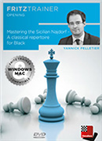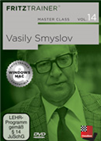“I was born twice”
Biographical account by André Schulz
 Najdorf was born on April 15, 1910 in Warsaw. His family was Jewish and gave him the name Mieczyslaw, which later became Miguel. Najdof was twelve when he started to play chess, and his first teacher was the well-known chess master and writer Savielly Tartakower. When he was 22 years old, Najdorf managed to draw two games against Alexander Alekhine — a sign of Najdorf’s great talent.
Najdorf was born on April 15, 1910 in Warsaw. His family was Jewish and gave him the name Mieczyslaw, which later became Miguel. Najdof was twelve when he started to play chess, and his first teacher was the well-known chess master and writer Savielly Tartakower. When he was 22 years old, Najdorf managed to draw two games against Alexander Alekhine — a sign of Najdorf’s great talent.
In the 1930s Najdorf became one of the world’s best players. In 1939, the Chess Olympiad in Buenos Aires changed his life dramatically: in the middle of the Olympiad, on 1 September 1939, the Second World War broke out after the Germans invaded Poland.
The Olympiad was nonetheless played to the end. Once the Olympiad came to an end, Najdorf decided to stay in Argentina. He thus escaped the Holocaust in Europe, but his wife, his child, his mother and four of his brothers were all killed by the Nazis.
Najdorf knew about the death of his wife and child before 1945. In an attempt to contact family and friends he decided to play a sensational blindfold exhibition in São Paulo, Brazil in 1947, hoping that news of this exhibition would spread to Germany, Poland or Russia and somehow reach his family. Najdorf played blindfolded against 45 opponents simultaneously, winning 39 games, losing 2 and drawing 4. But he did not hear from his family.
 This Najdorf-DVD is suited for the beginner as well as experienced club players. Pelletier presents a classical repertoire that's easy to learn and covers all you need to know about the Najdorf.
This Najdorf-DVD is suited for the beginner as well as experienced club players. Pelletier presents a classical repertoire that's easy to learn and covers all you need to know about the Najdorf.In 1944 Najdorf became an Argentinian, and between 1949 and 1975 he won the Argentinean national championship seven times. Back then, Argentina was one of the strongest chess nations of the world, and at Chess Olympiads Najdorf played on first board for the South American country. From 1950 to 1954 Najdorf’s team finished three times second at the Olympiads, always behind the dominating Soviets.

Miguel Najdorf playing black against Bobby Fischer at the 1960 Olympiad in Leipzig
Najdorf's individual successes include tournament victories at Prague 1946, Venice 1948, Bled 1950, Amsterdam 1950, Mar del Plata 1959 and Havana 1961. In 1950, FIDE awarded him the grandmaster title. During his career Najdorf played and won against a number of world champions: Mikhail Botvinnik, Vasily Smyslov, Mihail Tal, Tigran Petrosjan, and Bobby Fischer.
Najdorf was also a passionate Bridge player, he liked witty and lively exchanges, and for many years he wrote an entertaining chess column for the renowned Argentinian daily Clarin.
‘Don Miguel’ died on July 4, 1997 at the University Hospital in Malaga (Spain) due to complications during an operation.

Miguel Najdorf and Lev Polugaevsky (circa 1994)
The legendary Candidates Tournament in Zurich
 Smyslov cultivated a clear positional style and even in sharp tactical positions often relied more on his intuition than on concrete calculation of variations. Let our authors introduce you into the world of Vasily Smyslov.
Smyslov cultivated a clear positional style and even in sharp tactical positions often relied more on his intuition than on concrete calculation of variations. Let our authors introduce you into the world of Vasily Smyslov.In 1953, three years after the tournament in Budapest, the second-ever Candidates Tournament took place in Zurich. It was a gigantic event: 15 participants played a double-round-robin, which means each participant had to play 28 games.
Zurich 1953 is still one of the most famous tournaments in chess history, not least because of the legendary tournament book by David Bronstein, which many chess players consider to be one of the best chess books ever written. But though Bronstein is officially the author of this chess classic the idea to write this book goes back to Bronstein’s mentor Boris Vainshtein, a high-ranking and influential KGB officer. Vainshtein also wrote “the entire narrative part”, while Bronstein contributed only the analyses (Cp. Sosonko, The Rise and Fall, p. 139).
The event was won by Vasily Smyslov, who scored 18/28 to finish two points ahead of Bronstein, Paul Keres and Samuel Reshevsky.
In his second participation at a Candidates Tournament, Miguel Najdorf scored 14½ points to share sixth place with Efim Geller. On his way to a respectable finish, the Argentinian defeated Tigran Petrosian, Alexander Kotov, Mark Taimanov and Gideon Stahlberg.
All games played by Najdorf - Zurich 1953
Select an entry from the list to switch between games
Fighting against the Najdorf is always difficult, but GM Tiviakov demonstrates a very effective way to combat this popular opening. Crafty players take the fight to their opponents on their own terms, and starting with 2.Nc3 you'll learn how to take Najdorf connoisseurs into nebulous territory where they may quickly lose their way.
Links


















 Najdorf was born on April 15, 1910 in Warsaw. His family was Jewish and gave him the name Mieczyslaw, which later became Miguel. Najdof was twelve when he started to play chess, and his first teacher was the well-known chess master and writer Savielly Tartakower. When he was 22 years old, Najdorf managed to draw two games against Alexander Alekhine — a sign of Najdorf’s great talent.
Najdorf was born on April 15, 1910 in Warsaw. His family was Jewish and gave him the name Mieczyslaw, which later became Miguel. Najdof was twelve when he started to play chess, and his first teacher was the well-known chess master and writer Savielly Tartakower. When he was 22 years old, Najdorf managed to draw two games against Alexander Alekhine — a sign of Najdorf’s great talent.




